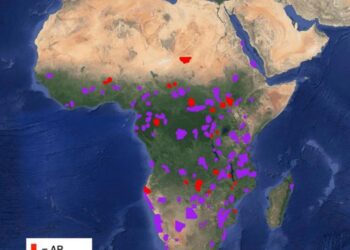Tuesday 16 April: A new scientific review1 published in Sustainable Production and Consumption explores how best to standardize measurement of the environmental impact of coffee – a commodity increasingly threatened by climate change2.
Tuesday 16 April: A new scientific review1 published in Sustainable Production and Consumption explores how best to standardize measurement of the environmental impact of coffee – a commodity increasingly threatened by climate change2.
Measurement of green coffee’s carbon footprint has traditionally varied, as is often the case for any agricultural lifecycle assessment. The Institute for Scientific Information on Coffee (ISIC) commissioned the French Agricultural Research Centre for International Development (CIRAD) to review current methodologies for green coffee, revealing a more precise picture of how to measure the environmental impact of the raw material used in one of the world’s most popular drinks.
Cécile Chéron-Bessou, lead CIRAD researcher on the review, explains: “Life cycle-based assessments are complex and based on numerous simplifications and choices. A key principle for these assessments is therefore absolute transparency around the exact choices and assumptions made as part of modelling. We hope our review will serve as a robust tool for transparent and sound measurement of green coffee’s carbon footprint – helping farmers and researchers to support good practices for sustainable coffee growing”.
CIRAD identified and reviewed 34 studies, alongside international agricultural guidelines on measuring carbon footprints. The studies were representative of the many different regions and settings coffee is grown in. For example, 72% of all studied farm systems were located in central and south America – making up 70% of global coffee production.
As highlighted in the review, the total carbon footprint of green coffee can vary greatly depending on a number of key factors. These include:
- Land Use Change – human-driven changes in use or management of land
- Varying levels of nitrogen fertilizer usage
- Coffee residues from pruning, leaf litter, and coffee husks – differing levels of residues vary emissions produced as they decompose and release stored carbon
- Wet process emissions – cleaning, sorting, and drying of coffee cherries and beans
The published review was conducted in parallel to a more detailed report3 that provides a series of recommendations to standardize measurement in these areas. For example, simple guidance to identify representative measurements for different coffee farm systems and consistently apply land use change modelling, and outlining how best to estimate total biomass (including roots) of other trees present in coffee systems. As coffee is a perennial crop, which lives for many years without replanting, the review also provides guidance on accurate modelling and average measurement across trees in different phases of maturity.
With this study, ISIC starts expanding its scope beyond health to sustainable coffee farming practices. Please visit the ISIC website to read the review’s recommendations in full and to find out more about Coffee & Sustainability.
-ENDS-
About ISIC
The Institute for Scientific Information on Coffee (ISIC) is a not-for-profit organisation, established in 1990 and dedicated to contributing and consolidating balanced scientific information on coffee production and consumption – providing a reference for professionals and authorities who address the health and wellbeing of both people and the environment.
It’s activities include:
- Study of scientific matters
- Evaluation of studies and scientific information
- Support of independent scientific research
- Dissemination of balanced scientific evidence and knowledge to a broad range of stakeholders
ISIC respects scientific research ethics in all its activities. ISIC’s communications are based on sound science and rely on scientific studies derived from peer-reviewed scientific journals and other publications.
ISIC members are six of the major European coffee companies: illycaffè, JDE Peet’s, Lavazza, Nestlé, Paulig and Tchibo.
The ISIC press office team can be contacted at the following address: isic.kaizo@kaizo.co.uk.
About Coffee & Sustainability
In 2022, ISIC broadened its focus to cover both the health of people and the environment.
Globally, there is rising awareness on the possible detrimental impacts of human activities on the environment, and an increasing realisation that enhanced sustainable practices will help secure coffee as a viable commodity over the long term.
ISIC is supporting independent scientific research on the environmental impact of coffee farming, guided by ongoing consideration of the latest scientific developments and current knowledge gaps.
About CIRAD
CIRAD is the French agricultural research and international cooperation organization working for the sustainable development of tropical and Mediterranean regions.
It works with its partners to build knowledge and solutions for resilient farming systems in a more sustainable, inclusive world. It mobilizes science, innovation and training in order to achieve the Sustainable Development Goals. Its expertise supports the entire range of stakeholders, from producers to public policymakers, to foster biodiversity protection, agroecological transitions, food system sustainability, health (of plants, animals and ecosystems), sustainable development of rural territories, and their resilience to climate change. CIRAD works in some fifty countries on every continent, thanks to the expertise of its 1800 staff members, including 1240 scientists, backed by a global network of some 200 partners. It also supports French scientific diplomacy operations. www.cirad.fr
References
- Chéron-Bessou C. et a. (2024) Unravelling life cycle impacts of coffee: Why do results differ so much among studies? Sustainable Production and Consumption. Published online:
- Grüter R., et al (2022) Expected global suitability of coffee, cashew and avocado due to climate change, PLOS ONE. Available at: doi.org/10.1371/journal.pone.0261976
- CIRAD (2024) Review on Green Coffee Carbon Footprint. Available at:
Journal
Sustainable Production and Consumption
Method of Research
Systematic review
Subject of Research
Not applicable
Article Title
Unravelling life cycle impacts of coffee: Why do results differ so much among studies?
Article Publication Date
8-Apr-2024
Discover more from Science
Subscribe to get the latest posts sent to your email.



